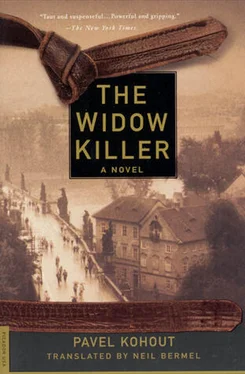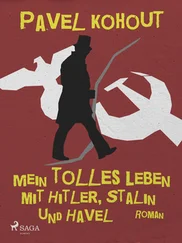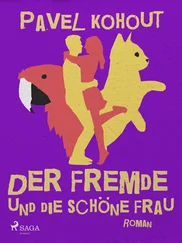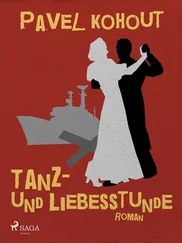Five unsuccessful days brought nonetheless one encouraging result: The five policemen — three on the street and two in the house — calmed down and learned to work together.
“If he makes a move, we’ve got him,” Morava announced cautiously to Beran, who had requested a report each time “the hook was cast,” as he said.
“Just so you don’t get too comfortable,” he said to Morava, explaining his unwearying interest in the operation. “I have to keep reminding you that he’ll appear right when your attention wanders. And Morava: I assume you’re following the rules just as strictly when the German woman’s on shift.”
He saw the red seep into the adjunct’s face, and immediately soothed him.
“Forgive me; that was out of place. At least you see that even old age is no guarantee against stupidity. I was thinking about her disadvantage, not knowing Czech.”
Of course, Morava took the warning seriously enough to visit Buback again about Marleen Baumann.
“Thank you for your consideration,” the German said. “Grete— that’s her real name, by the way — is aware of the problem. In an emergency she’ll rely on voice intonation to figure out what’s happening. She thinks she’s quick enough to manage it.”
“Please tell her that I admire her. We’d like — my fiancee and I — to invite her — and you too, of course — to dinner sometime….”
What am I saying, he wondered belatedly.
Buback could not conceal his surprise.
“Aren’t Germans risky guests for you these days?”
“Well yes, that’s true…,” Buback had said exactly what Morava was thinking, but the Czech’s resolve did not fail him. “Except since they’re both putting their lives on the line, they should get to know each other a bit. And we’re part of it as well….”
“I’ll pass it on,” Buback said after a short pause. “In any case, thank you again. By the way, she’s quite fond of your fiancee… as am I…”
Then his eyes slid quickly to his watch.
“Will you excuse me? I still have some work to do. Grete is on duty at the cemetery tomorrow and Sunday; would some time after that suit you?”
“I’ll pass it on,” Morava repeated, for a change.
They parted with a hearty handshake. What had caused this shift, he wondered on his way back to the office. The two women, he realized; mine and his. Strange, very strange. Can ordinary human sympathy really scale these moats and barriers?
With this thought fresh in his mind he went to see Jitka. Beran was at another senseless meeting with Rajner and had sent her home, saying she had done her share. Jitka, however, refused to see her “two spring strolls” as a full day’s work.
“I wouldn’t be doing myself any favors, anyway,” she explained to the superintendent. “You’d make such a mess of the paperwork that I’d have to come in Sundays to sort things out.”
When she heard Morava’s embarrassed confession how in her name he invited Buback and Grete to her house, she was quick to respond.
“They’re the enemy, no doubt about that. Their nation has caused mankind so much suffering that they have to accept part of the blame. But in a couple of months they’ll be defeated, and there’ll still be fifty million of them. And what then? My papa once tried to imagine how he’d behave if he met a German on the street after the war. ’Out of my way, German,’ he wanted to say; ’sidewalks are for human beings.’ I don’t believe he’s changed, even after what just happened to him. Now, I don’t know about Buback — by the way, he’s started to behave quite decently — but his Grete doesn’t seem to have anything in common with the Nazis other than their German ancestry.”
“Except people“—he could not help saying it—“might say we’re collaborators.”
“Yes.” She nodded seriously. “And after all, it’s possible they both have other motives, like he said.” She pointed toward Beran’s office. “But what if they’re just people who have finally come to their senses? What if they’re seriously trying to atone for their sins? Should we reject them just because we’re afraid of being slandered or mistakenly fingered? We’ll just watch what we say.”
From the hallway Superintendent Hlavatý stepped in. A couple of years earlier he had been one of Morava’s first instructors. His department was theft, and he was the bane of Prague’s pickpockets.
“Hello, Jitka; hello, Morava,” he addressed them both before turning to the detective. “Why do you keep shoving that stolen saint at me? The picture was returned a long time ago and criminal charges retracted.”
“Sorry about that,” Morava said guiltily. “I didn’t know what to do with it, and the priest had written twice already….”
“He didn’t get your announcement, by any chance? I mean the description of that deviant?”
“We did send it to priests.” Jitka now turned to Morava as well.
He still could not see the point.
“But what does it have in common with—”
“I had no idea“—Hlavatý winked at him, as if preparing him for an excellent joke—“so I had a word with my experts. The Romans supposedly disembowled Saint Reparata alive, and cut off her head and breasts. Her heart, however, escaped in the shape of a white dove.”
“Oh my God…,” Morava breathed. “Oh my God!”
Before leaving for home with Jitka, he first called the emergency number Buback had given him. He left a message for the German that a fresh trail had been found, and Assistant Detective Morava would be waiting the next morning to hear when and where to pick him up.
In the house at Kav  í Hory he heated pots of water for Jitka’s bath. When he had poured the fifth and last one into the battered enamel tub, he retired to the kitchen while Jitka undressed and plunged in; with the exception of the moment when she had asked to bear his child, she was still too shy to be naked around him.
í Hory he heated pots of water for Jitka’s bath. When he had poured the fifth and last one into the battered enamel tub, he retired to the kitchen while Jitka undressed and plunged in; with the exception of the moment when she had asked to bear his child, she was still too shy to be naked around him.
Afterward he brought in the kitchen stool and sat down, half turned away from her. They decided to put off the wedding, gossip or no gossip, until this hunt — and maybe even the war itself — was over, and then they dreamed together in a confidential half-whisper of the things that awaited them in ten, twenty, and many more years. For a short while neither the monstrous murderer nor the fiery steam-roller of war that had separated them from their loved ones (may the Lord protect them) could threaten them.
They prayed once more together, aloud, for themselves, their family, and their child who was there with them. In their attic bed their conversation gradually slackened and grew quieter, until, overcome by fatigue and hopes, they fell asleep in each others’ arms almost simultaneously, he with his chin in her hair, she as if nursing, her mouth at his breast.
Ahillock with a church, rectory, and cemetery hid the market town of Klá  terec from their view, bulging out of the north Bohemian plain as if it had been artistically inserted there to soften the dramatic backdrop of extinct volcano cones. The parish priest and his cook, an older woman, seemed to step right from the pages of a color calendar, from their rounded bellies to their rosy cheeks. He was close to sixty and spoke passable German; Morava did not have to translate.
terec from their view, bulging out of the north Bohemian plain as if it had been artistically inserted there to soften the dramatic backdrop of extinct volcano cones. The parish priest and his cook, an older woman, seemed to step right from the pages of a color calendar, from their rounded bellies to their rosy cheeks. He was close to sixty and spoke passable German; Morava did not have to translate.
The two policemen wanted to see the picture first. The priest unlocked the church with a large key, drawing it forth from his cassock, where it hung around his neck. God’s tabernacle in Klá  terec was not especially beautiful or luxurious and spoke of a land neither wealthy nor pious. The only adornments on the walls were the Stations of the Cross, garishly cheap and vulgar in execution. Seeing their searching glances, the priest explained that they would find Saint Reparata in the sacristy.
terec was not especially beautiful or luxurious and spoke of a land neither wealthy nor pious. The only adornments on the walls were the Stations of the Cross, garishly cheap and vulgar in execution. Seeing their searching glances, the priest explained that they would find Saint Reparata in the sacristy.
Читать дальше

 í Hory he heated pots of water for Jitka’s bath. When he had poured the fifth and last one into the battered enamel tub, he retired to the kitchen while Jitka undressed and plunged in; with the exception of the moment when she had asked to bear his child, she was still too shy to be naked around him.
í Hory he heated pots of water for Jitka’s bath. When he had poured the fifth and last one into the battered enamel tub, he retired to the kitchen while Jitka undressed and plunged in; with the exception of the moment when she had asked to bear his child, she was still too shy to be naked around him. terec from their view, bulging out of the north Bohemian plain as if it had been artistically inserted there to soften the dramatic backdrop of extinct volcano cones. The parish priest and his cook, an older woman, seemed to step right from the pages of a color calendar, from their rounded bellies to their rosy cheeks. He was close to sixty and spoke passable German; Morava did not have to translate.
terec from their view, bulging out of the north Bohemian plain as if it had been artistically inserted there to soften the dramatic backdrop of extinct volcano cones. The parish priest and his cook, an older woman, seemed to step right from the pages of a color calendar, from their rounded bellies to their rosy cheeks. He was close to sixty and spoke passable German; Morava did not have to translate.










